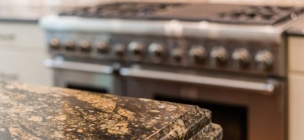Granite Versus Quartz Countertops, Which Is Right for You?
Jun 05, 2018 10:45
When it comes to planning a kitchen, one of the hardest decisions to make, besides the layout, is the material that you want to use for granite countertops. One of the first things that anyone notices when walking into a kitchen are the countertops. You want to find something that is durable, but you also want it to be beautiful and within your price range. Getting all three of those things can be difficult.
If you are considering using granite or quartz, then you should know the pros and cons to both. Very similar products, they can sometimes look the same, but what they provide the homeowner is very different.
Quartz countertops
Although not entirely a natural material, quartz is fabricated from real quartz, so, technically, it is natural. Quartz is one of the hardest minerals on earth, which is why using it for a countertop makes sense.
The visual advantage of using quartz is that it comes in a vast number of colors and other things can be added to it (like metal or glass) to give it more of a sheen look. When you add different materials, it makes it more of a one-of-a-kind and unusual piece, which gives it a custom feel.
On top of having a number of options to choose from, quartz is also nonporous, which means that it will resist stains unlike marble and other types of countertop material. Since it is nonporous, it also won’t absorb bacteria or allow it to fester, which is key for kitchen areas. Easy to clean up, it is perfect for big and small families alike.
Another thing that quartz offers is the ability to choose a countertop that looks like marble, but it isn’t as fragile or susceptible to chipping or staining. So, it is the perfect solution for someone who wants the marble look but is practical enough to know that marble won’t last as long or end up looking as good after a couple of years of abuse.
Granite countertops
Granite is one of the most common types of materials used in kitchens across America for good reason. It is preferred by many homeowners because it is highly durable and chip resistant. It is similar to quartz because it is nonporous and can resist water and, if you maintain it correctly, stains and other mishaps that can happen.
One of the back draws to using Granite over quartz, is that it requires more maintenance. If you want to ensure that it doesn’t stain, you do have to polish it and make sure that you seal it regularly. But, like quartz, it can withstand high temperatures, so you won’t hurt it by putting hot plates or pans on it, and, it won’t scratch if something runs across it like other countertop material.
Price factors
Although not a huge price difference, depending on the type of granite or quartz you choose, Granite usually costs about $60 per square foot versus about $68 to $100 per square foot when you are dealing with quartz. If the price is a factor, that small difference can really start to add up for a large kitchen remodel. Since the materials are pretty similar with the exception of maintenance requirements, it is important to know whether or not spending the extra for quartz is really warranted.
When you should choose one over the other
If you have a rental property that you aren’t going to be around to maintain or to watch, then it might behoove you to pay a little extra so that you aren’t paying to repair granite stains if your tenant isn’t very clean. Since you can be sure that quartz won’t stain, chip, or crack, if you only have to seal it once, then you are going to be doing yourself a favor and saving a lot of time.
However, if you are worried about the durability in your own home, then quartz and granite are similar products that are both perfect for your kitchen. Unlike other countertop material, granite and quartz provide strength, and you can have the assurance that they can handle whatever your life will throw at them.
In the end, it’s all about what style you like. If you are looking for a unique one-of-a-kind countertop material, then quartz might be the answer. If you are looking for tradition and a slightly lower cost, granite might be ideal.







































































